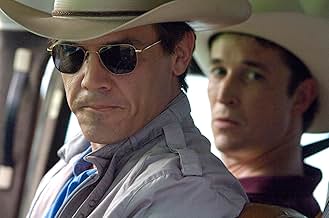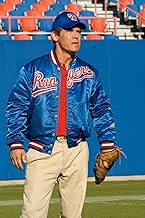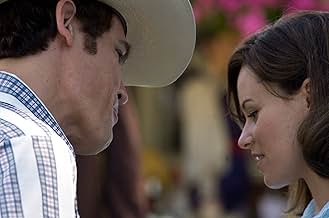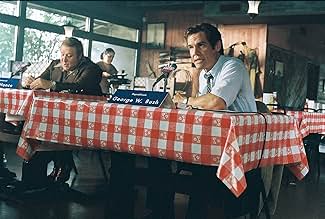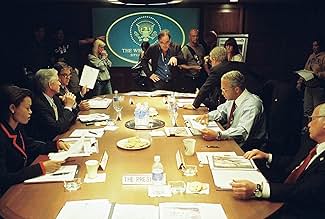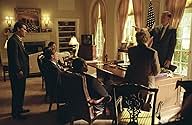IMDb रेटिंग
6.3/10
51 हज़ार
आपकी रेटिंग
जॉर्ज डब्ल्यू बुश के जीवन और राष्ट्रपति पद के समय को दर्शाया गया है.जॉर्ज डब्ल्यू बुश के जीवन और राष्ट्रपति पद के समय को दर्शाया गया है.जॉर्ज डब्ल्यू बुश के जीवन और राष्ट्रपति पद के समय को दर्शाया गया है.
- पुरस्कार
- 1 जीत और कुल 8 नामांकन
Thandiwe Newton
- Condoleezza Rice
- (as Thandie Newton)
फ़ीचर्ड समीक्षाएं
The last of Stone's "Presidential" trilogy after JFK (which was better) and Nixon (which wasn't), "W" relates the days of the USA's 43th President, George W Bush.
It came up as the heat about the subject's presidency was still felt, while opinions were still hot, and yet the movie is surprisingly subtle and empathic, walking a fine line between biopic and comedy. Also, it is neither an attack on the Bushes, or on the Republican party - what would have been expected from rather liberal Stone. In fact, Bush the father's sole term is even referenced as a time of sober wisdom and sound management. Despite Stone's haste, the film stands the test of time admirably.
Actors are absolutely remarkable and well-directed, everyone of them. Photography is expertly executed. Music is, however, of some curiosity, and its circus-like presence does a big part in lightening the tone. That odd tonal dysphoria makes the film quite hard to classify, and even for the interested, a second viewing might be necessary once the expectations are out of the way.
All in all, what we have here is a fine movie. If you are an American conservatives, or even someone who voted Bush in, I really don't think you'll be outraged by anything here, to the contrary, maybe, as Bush is made human beyond the drama/comedy of his administration. I heard Clinton personally gave Bush a copy of the movie, saying he'd like it.
It came up as the heat about the subject's presidency was still felt, while opinions were still hot, and yet the movie is surprisingly subtle and empathic, walking a fine line between biopic and comedy. Also, it is neither an attack on the Bushes, or on the Republican party - what would have been expected from rather liberal Stone. In fact, Bush the father's sole term is even referenced as a time of sober wisdom and sound management. Despite Stone's haste, the film stands the test of time admirably.
Actors are absolutely remarkable and well-directed, everyone of them. Photography is expertly executed. Music is, however, of some curiosity, and its circus-like presence does a big part in lightening the tone. That odd tonal dysphoria makes the film quite hard to classify, and even for the interested, a second viewing might be necessary once the expectations are out of the way.
All in all, what we have here is a fine movie. If you are an American conservatives, or even someone who voted Bush in, I really don't think you'll be outraged by anything here, to the contrary, maybe, as Bush is made human beyond the drama/comedy of his administration. I heard Clinton personally gave Bush a copy of the movie, saying he'd like it.
W. Was released in the wrong time. Probably 10 years too soon. If you stumble upon this film now, you will be entertained. Because this story and this character are just absurd. Politics aside, Brolin does a good job portraying W.
I suggest watching VICE first and then back to back this one and you will appreciate it more.
7,1/10.
I suggest watching VICE first and then back to back this one and you will appreciate it more.
7,1/10.
One word sums up how I felt while watching W: uncomfortable.
I went into this film expecting more of an absurdist comedy than a tragedy. The level of realism was far beyond what I expected. For the most part, the cast, makeup, and casting crew did such a good job with the characters that it was very easy to imagine that these were not actors on the screen but the actual people. Josh Brolin's characterization of W was certainly Oscar-worthy.
Even better than Brolin's part was Phedon Papamichael's photographic direction. The job of the Director of Photography is to bring the story to life through the creation of images to draw the attention of the viewer where the Director wants. Few films are as good of an example of this as W. Papamichael used the camera to force moral and emotional perspective in a way that I have rarely seen outside of the films of Stanley Kubrick. I've only seen the film once, viewing it as a complete work. I intend to watch it again to study the photography.
Overall, I thought the film was fair in its treatment of the actual people involved. The most ardent Bush supporters will not like it, but to still be that supportive of him in the final months of his second term, you either have to not be paying attention or be uncritical in all of your thought. While artistic license was taken throughout the film, the portrayal of all events and people, with the possible exception of Dick Cheney, were far more grounded in reality and recorded history than I expected.
The film made me uncomfortable on multiple levels, which is why it succeeds and deserves such a high rating. The portrayal of Bush's relationship with his parents, especially his father, forces the viewer to feel sorry for him. The overt religiosity that pervades the public service portion of his life must anger anyone who believes strongly in the separation of church and state. There are many moments when, with any other characters, the film should have generated much laughter. Only one moment in the film actually caused more than one person in the theater to laugh. I guess 4000+ dead soldiers drains the humor out of even the most hilarious gaffes.
I would recommend this film to anyone who wants to see a realistic portrayal of historical events. I wish Stone had waited until Bush was out of office to make it, though. While it captures the major events that were involved in building the Bush legacy, it ends far too early.
I went into this film expecting more of an absurdist comedy than a tragedy. The level of realism was far beyond what I expected. For the most part, the cast, makeup, and casting crew did such a good job with the characters that it was very easy to imagine that these were not actors on the screen but the actual people. Josh Brolin's characterization of W was certainly Oscar-worthy.
Even better than Brolin's part was Phedon Papamichael's photographic direction. The job of the Director of Photography is to bring the story to life through the creation of images to draw the attention of the viewer where the Director wants. Few films are as good of an example of this as W. Papamichael used the camera to force moral and emotional perspective in a way that I have rarely seen outside of the films of Stanley Kubrick. I've only seen the film once, viewing it as a complete work. I intend to watch it again to study the photography.
Overall, I thought the film was fair in its treatment of the actual people involved. The most ardent Bush supporters will not like it, but to still be that supportive of him in the final months of his second term, you either have to not be paying attention or be uncritical in all of your thought. While artistic license was taken throughout the film, the portrayal of all events and people, with the possible exception of Dick Cheney, were far more grounded in reality and recorded history than I expected.
The film made me uncomfortable on multiple levels, which is why it succeeds and deserves such a high rating. The portrayal of Bush's relationship with his parents, especially his father, forces the viewer to feel sorry for him. The overt religiosity that pervades the public service portion of his life must anger anyone who believes strongly in the separation of church and state. There are many moments when, with any other characters, the film should have generated much laughter. Only one moment in the film actually caused more than one person in the theater to laugh. I guess 4000+ dead soldiers drains the humor out of even the most hilarious gaffes.
I would recommend this film to anyone who wants to see a realistic portrayal of historical events. I wish Stone had waited until Bush was out of office to make it, though. While it captures the major events that were involved in building the Bush legacy, it ends far too early.
Me and my girlfriend are both staunch democrats and we both thoroughly enjoyed. Love or hate him, the guys lived an interesting life. You see a transformation from a spoiled frat boy begging his dad to buy him a baseball team to a competent public servant who genuinely wants to do right by his country. Definitely watch.
Two of my least favorite people in one project! A president with a blunt intellect, but a remarkable ability to project a simple story. And a filmmaker with the same qualities. Each would be relatively harmless as clerks who amuse at lunch breaks, but these are men whose inadequacies break worlds.
It is no wonder that this portrays Bush respectfully. No wonder that it is all about intent: the man is a good, honest, unselfish man whose only weakness was a vision of an unrealistic utopia and the accident of being surrounded by fools and devils. I believe that all of Stone's projects are autobiographical and he impresses on them his own story. Its Woody Allen, except instead of placing himself in the cosmic forces of personal relationships and self, he wanders among what he sees is a cosmos of global conspiracy. That he is able to make a living in Hollywood is, I think, because our notions of noir are close enough to this so that he (and Spike Lee) can bloviate and make a living.
As time goes on, he worries more and more about himself, so he makes his heroes basically good men, lost.
But this time history bucks him. The culpability of this man cannot be explained away by blaming Rove and Cheney. His qualms about torture are known to not have happened. We know that he pushed for policies that will be evaluated in time as war crimes. Now, he may have done that with noble intent, but more ruthless and scheming than this golden Rube we see here.
This is a disaster for history. Because so few Americans read books, instead getting their history from films and blogmobs.
The cinematic values of Stone's prior work are not even visible. The energy of "Platoon," the craft of "JFK" are gone. We have normal TeeVee movie framing here.
I think we should vote Stone out.
Ted's Evaluation -- 1 of 3: You can find something better to do with this part of your life.
It is no wonder that this portrays Bush respectfully. No wonder that it is all about intent: the man is a good, honest, unselfish man whose only weakness was a vision of an unrealistic utopia and the accident of being surrounded by fools and devils. I believe that all of Stone's projects are autobiographical and he impresses on them his own story. Its Woody Allen, except instead of placing himself in the cosmic forces of personal relationships and self, he wanders among what he sees is a cosmos of global conspiracy. That he is able to make a living in Hollywood is, I think, because our notions of noir are close enough to this so that he (and Spike Lee) can bloviate and make a living.
As time goes on, he worries more and more about himself, so he makes his heroes basically good men, lost.
But this time history bucks him. The culpability of this man cannot be explained away by blaming Rove and Cheney. His qualms about torture are known to not have happened. We know that he pushed for policies that will be evaluated in time as war crimes. Now, he may have done that with noble intent, but more ruthless and scheming than this golden Rube we see here.
This is a disaster for history. Because so few Americans read books, instead getting their history from films and blogmobs.
The cinematic values of Stone's prior work are not even visible. The energy of "Platoon," the craft of "JFK" are gone. We have normal TeeVee movie framing here.
I think we should vote Stone out.
Ted's Evaluation -- 1 of 3: You can find something better to do with this part of your life.
क्या आपको पता है
- ट्रिवियाRichard Dreyfuss stated his disappointment with the film in an appearance on The View (1997). He said it was "6/8 of a good film" and called Oliver Stone "a fascist". Stone retorted in an interview that working with Dreyfuss "was the single worst experience I've ever had with an actor in my life."
- गूफ़Cheney says "Atta met Saddam's intel chief in Czechoslovakia." Czechoslovakia split into the Czech Republic and Slovakia in 1993, ten years earlier.
- भाव
Gen. Colin Powell: Funny Dick, I remember you once agreeing that going all the way in Baghdad would be a mistake.
Dick Cheney: Well, I think you made a bigger boo-boo Colin. You could have been president.
Gen. Colin Powell: Fuck you.
- क्रेज़ी क्रेडिटAt the very end of the credits, you see a Christian cross with a period. It morphs into the W-period logo of the movie.
- कनेक्शनFeatured in Sunday AM: एपिसोड #4.9 (2008)
- साउंडट्रैकThe Star Spangled Banner
Lyrics by Francis Scott Key and music by John Stafford Smith
Arranged by Francis Scott Key (as Francis Key) and Michael Licari
Provided by APM Music
टॉप पसंद
रेटिंग देने के लिए साइन-इन करें और वैयक्तिकृत सुझावों के लिए वॉचलिस्ट करें
विवरण
- रिलीज़ की तारीख़
- कंट्री ऑफ़ ओरिजिन
- आधिकारिक साइटें
- भाषाएं
- इस रूप में भी जाना जाता है
- Hijo de... Bush
- फ़िल्माने की जगहें
- उत्पादन कंपनियां
- IMDbPro पर और कंपनी क्रेडिट देखें
बॉक्स ऑफ़िस
- बजट
- $2,51,00,000(अनुमानित)
- US और कनाडा में सकल
- $2,55,34,493
- US और कनाडा में पहले सप्ताह में कुल कमाई
- $1,05,05,668
- 19 अक्तू॰ 2008
- दुनिया भर में सकल
- $2,95,60,587
- चलने की अवधि2 घंटे 9 मिनट
- रंग
- ध्वनि मिश्रण
- पक्ष अनुपात
- 2.35 : 1
इस पेज में योगदान दें
किसी बदलाव का सुझाव दें या अनुपलब्ध कॉन्टेंट जोड़ें








